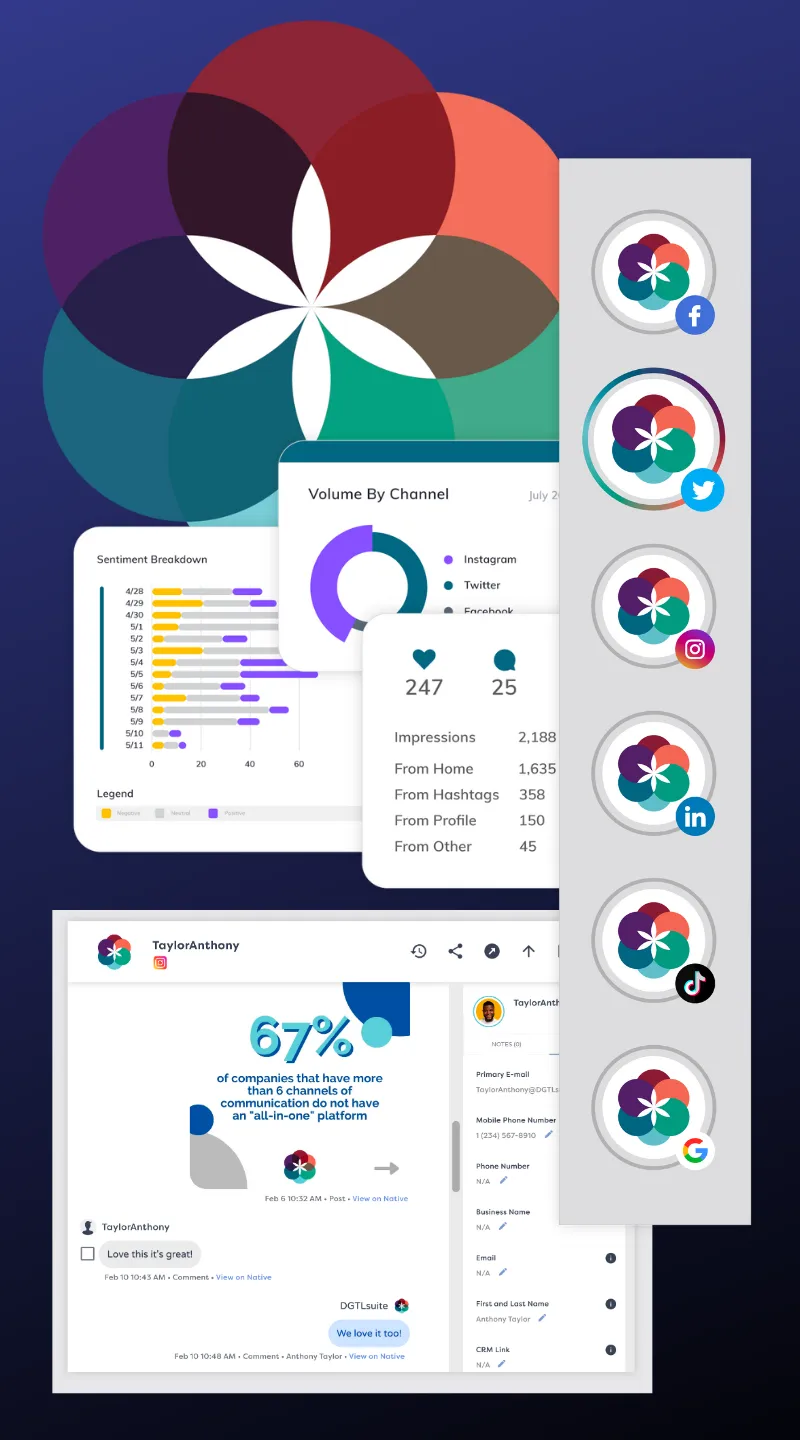Do you ever feel like managing social media is more about managing chaos? Drafting captions, picking hashtags, posting on time, tracking trends—it’s a never-ending list of tasks.
And while you’re managing all that, your competitors are connecting with audiences faster and more efficiently. What’s their secret? AI.
AI changes the way social media management works. It helps by automating repetitive tasks, providing clear insights into what’s working, and identifying opportunities to connect with your audience more effectively.
With AI, you can focus on strategy and creativity instead of being tied up with day-to-day logistics.
This guide will show you how AI can improve your social media management. From optimizing your workflow to delivering tailored content and tracking trends, you’ll discover practical ways to integrate AI into your efforts and make every action count!
What is the Role of AI in Social Media Management?
The internet has changed how we live, work, and connect, and social media sits at the center of it all. However, with the sheer volume of content and conversations happening online every second, managing it effectively can feel like a full-time job.
Luckily, AI can handle the heavy lifting so you can focus on the bigger picture: building connections and growing your brand.
AI can make a difference in a number of ways.
Automating Repetitive Work
Repetitive tasks can take up valuable time and leave you feeling stuck in a cycle of busy work.
Tasks like scheduling posts or coming up with captions might be necessary, but they’re hardly the best use of your energy. AI makes these chores easier, so you can focus on more impactful parts of your strategy.
AI tools like DGTLsuite handle scheduling posts effortlessly, making sure they go live when your audience is most active. Platforms like Copy.ai or Jasper can suggest ideas in seconds, customized to your brand voice and audience.
By automating these routine tasks, AI does more than save precious time—it clears mental space for creativity and strategic thinking.
Instead of juggling deadlines for mundane work, you get to concentrate on connecting with your audience in meaningful ways, which is arguably more important.
Turning Data Into Actionable Insights
Data can feel overwhelming—views, clicks, likes, shares, comments, and more. Sifting through endless charts to figure out what’s working on social media isn’t just time-consuming; it can leave you scratching your head.
AI steps in to simplify all that. It collects numbers and translates them into clear, actionable insights that you can actually use.
Here’s how AI makes sense of your data:
- Spotting trends: AI tools analyze patterns in engagement to reveal what types of posts resonate most with your audience.
- Audience breakdown: AI can show you key demographics, like age, location, and preferences, so you know who’s paying attention.
- Optimal posting times: Forget guessing—AI tells you when your audience is most active so your posts get maximum reach.
- Performance analysis: It identifies which campaigns or posts worked well (and why), giving you a blueprint for future success.
- Custom recommendations: Some tools even suggest changes, like tweaking your tone or using specific hashtags for better results.
AI doesn’t let you drown in raw data; you get insights delivered in a way that’s easy to understand and apply. That said, you can spend less time analyzing numbers and more time creating content that hits the mark.
Creating Personalized Content
Generic content doesn’t cut it anymore. People want posts that speak directly to them, and AI makes that easier than ever.
By analyzing your audience’s behaviors, interests, and preferences, AI helps you craft content that feels personal and relevant—and it’s worth the effort.
In fact, 89% of marketers report seeing a positive ROI when they use personalization in their campaigns.
AI takes the guesswork out of understanding what your audience wants. It can analyze engagement patterns to suggest captions, visuals, and messaging that truly resonate.
Whether it’s tailoring content to different demographics or adapting posts to fit specific user preferences, AI helps you connect with your followers on a deeper level.
So, what happens? Posts that feel authentic, timely, and meaningful. Instead of hoping your content sticks, you’ll have a personalized strategy that builds stronger connections and drives measurable results for your brand.
Spotting Trends and Conversations
Keeping up with what’s buzzing on social media can feel like a guessing game, but AI takes the mystery out of it. It scans through conversations, hashtags, and mentions to show you what’s catching people’s attention.
Think of it as having a real-time pulse on your audience. Whether it’s a topic that’s picking up steam or a shift in how people are talking about your industry, AI gives you a heads-up so you can jump in at the right moment.
When you stay on top of trends, you’re showing your audience that you’re paying attention to what matters to them. From joining a viral conversation to creating content that taps into the mood of the moment, AI keeps you in the loop and ready to respond.
Improving Customer Engagement
Customer engagement is all about making your audience feel heard, valued, and connected. But keeping up with every message, comment, or inquiry on social media can be overwhelming—especially when people expect fast responses.
Here’s where AI steps in to make life easier and your engagement stronger.
- Faster response times: 46% of customers expect companies to reply within four hours, and slow responses can be costly—52% of customers stop buying from a business that doesn’t respond quickly. AI chatbots can handle this demand effortlessly by delivering instant answers to common questions 24/7.
- Seamless customer support: AI doesn’t just reply fast; it also keeps the tone professional and the answers accurate so your audience gets the help they need without feeling like they’re talking to a robot.
- Engaging conversations: With the ability to use natural language processing, AI chatbots can create engaging, human-like conversations that make followers feel valued.
- Personalized experiences: AI tools can analyze customer data to tailor responses, turning a generic interaction into one that feels personal and thoughtful.
Using AI for customer engagement helps you respond more efficiently and provide a better experience for your audience.
Quick, friendly interactions not only keep your followers satisfied but also give your team more time to handle challenging or high-priority tasks!
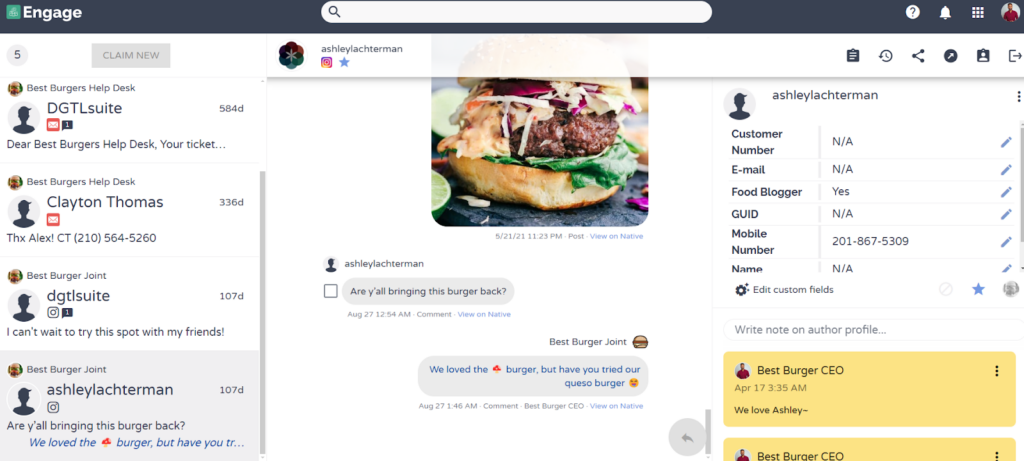 Types of AI Tools for Social Media
Types of AI Tools for Social Media
AI tools for social media are designed to save time and keep your strategy organized, no matter what stage of planning or execution you’re in. Let’s break down the different types and how they can fit into your workflow.
Content Creation Tools
Creating fresh, engaging content every day can be a challenge, especially when you’re managing multiple social channels. This is where AI content creation tools step in to make your job a whole lot easier.
Tools like Copy.ai can help you brainstorm ideas, craft catchy captions, and even generate entire posts in seconds.
Need hashtags to boost visibility? They’ve got that covered too. These tools analyze your brand’s tone and your audience’s preferences to deliver content that feels authentic and on-point.
What makes these tools so useful is how much time they save. Instead of staring at a blank screen wondering what to write, you can plug in a few prompts and let the AI do the heavy lifting. You’re still in control—it’s your voice, your ideas—but the process is faster and less stressful.
Scheduling and Posting Tools
Keeping your social media presence active and engaging takes consistent effort, which means you need something to help you keep track.
DGTLsuite, for example, simplifies the entire process by automating your content calendar and helping you stay organized. You can plan your content days or weeks in advance, which helps make sure everything is ready to go while DGTLsuite takes care of posting it at the right time.
A key feature of scheduling tools is the ability to organize all your content in one place. For instance, you can:
- Map out your entire calendar
- Preview your posts will look across different social media platforms
- Adjust your schedule as needed
Many tools also come with drag-and-drop functionality, making it simple to shuffle things around when plans change.
Another advantage is the flexibility they offer. You’re not tied to your desk or phone, racing to hit “publish” at the right time. Scheduling tools take care of that for you so you can focus on other parts of your strategy, like engaging with followers or analyzing performance.
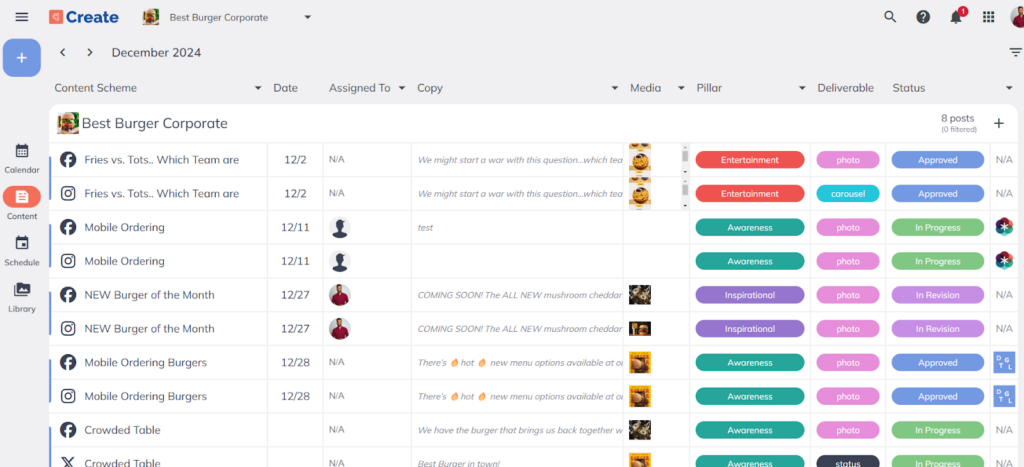
Analytics Platforms
Analytics platforms are your behind-the-scenes guide to what’s really happening with your social media.
They don’t just show you vanity metrics like likes and followers—they dig deeper to reveal how your audience interacts with your content and what’s driving those interactions. Tools like DGTLsuite and Google Analytics take all that data and turn it into simple, actionable insights.
Here are some key metrics these tools help you track:
- Engagement rates: How many people are liking, sharing, or commenting on your posts.
- Audience demographics: Who’s actually following you—age, location, gender, and interests.
- Reach and impressions: How many people saw your content, and how often.
- Click-through rates: The number of people clicking on your links.
- Top-performing posts: What’s grabbing the most attention and engagement.
With this kind of insight, you can stop guessing and start making data-driven decisions.
Whether it’s figuring out the best type of content to post or knowing when your audience is most active, analytics tools help you understand your audience and refine your strategy to make your social media efforts way more effective.
Chatbots and Customer Support Tools
AI-powered chatbots are changing the way businesses handle customer interactions on social media. They’re always online, ready to provide instant responses to routine inquiries, so your customers never feel ignored.
These tools make it possible to offer 24/7 support, which helps improve customer satisfaction while taking some of the pressure off your team.
For example, chatbots don’t just respond quickly—they’re designed to feel conversational and natural.
They can answer FAQs, guide users to the right resources, and even assist with things like bookings or purchases. Plus, they learn from past interactions, which means their responses get smarter and more accurate over time.
Here’s what AI chatbots bring to the table:
- They’re ready to help anytime, day or night.
- No waiting around for answers, even during peak hours.
- They provide accurate and reliable information every time.
- They can handle multiple inquiries simultaneously, no matter how busy it gets.
- They adapt responses based on customer data for a more tailored experience.
Social Listening Tools
Ever wondered what people are really saying about your brand online? Social listening tools like Brandwatch and Mention can tell you. These tools track mentions of your brand and dig deeper; they analyze the tone of conversations and spot trends before they blow up.
Think of it as getting insider info. Are people loving your latest campaign, or are there whispers of frustration you should address?
Social listening tools sift through all the noise and give you the highlights. If there’s a surge of chatter about a new trend in your industry, you can jump in early and make your mark.
They’re also great for keeping tabs on your competitors and finding out what customers want but aren’t getting.
On top of that, they help you identify key influencers who are already talking about your brand so you can build relationships and grow your reach.
Best Ways to Use AI to Maximize Your Social Media Strategy
AI can completely transform the way you manage your social media presence, but it’s most effective when used strategically.
So, we’ve compiled some of the best ways you can implement AI into your social media marketing strategies.
1. Automate Your Most Tedious Tasks
Managing social media comes with a lot of repetitive work, and it’s easy for these tasks to eat into your day. That’s where AI steps in to take over the boring stuff so you can focus on creativity and strategy—the parts that really make an impact.
With AI, tasks that used to require hours of manual effort are handled in the background, which frees up time and mental energy. Here’s a look at some of the routine jobs AI can take off your plate:
- Scheduling posts: Plan your content in advance and let AI handle publishing at the best times.
- Responding to FAQs: AI chatbots answer common customer questions instantly, day or night.
- Monitoring mentions: Stay on top of brand mentions without having to search for them yourself.
- Suggesting captions: AI tools provide ideas for engaging captions tailored to your audience.
- Analyzing performance: Automatically track metrics and identify trends without crunching the numbers manually.
What makes this automation so powerful is how easily it integrates into your workflow. You don’t have to worry about missing a post or being late to respond.
AI tools work quietly in the background, keeping everything on track and giving you the freedom to tackle higher-level tasks.
2. Personalize Content for Maximum Impact
People are drawn to content that feels like it’s meant just for them, but personalizing each and every response is impossible.
AI makes it easier to create personalized posts by analyzing your audience’s preferences, behaviors, and engagement patterns. Instead of guessing what your followers might like, AI helps you deliver content that hits the mark every time.
For example, AI tools can look at past interactions to figure out what type of content resonates with specific segments of your audience.
Let’s say you’re running a fitness brand. If some followers engage more with nutrition tips while others prefer workout videos, AI can help you create targeted posts for each group.
AI can also adapt your messaging to fit the preferences of your audience. For instance, if a particular demographic interacts more with casual, emoji-filled captions, AI will suggest using that tone. On the flip side, if another group prefers straightforward, professional language, AI adjusts accordingly.
It doesn’t stop there—AI can even personalize recommendations in real time. Think Spotify’s personalized playlists or Netflix’s tailored suggestions but applied to your social media. This level of customization builds trust and engagement because your audience feels like you genuinely understand them.
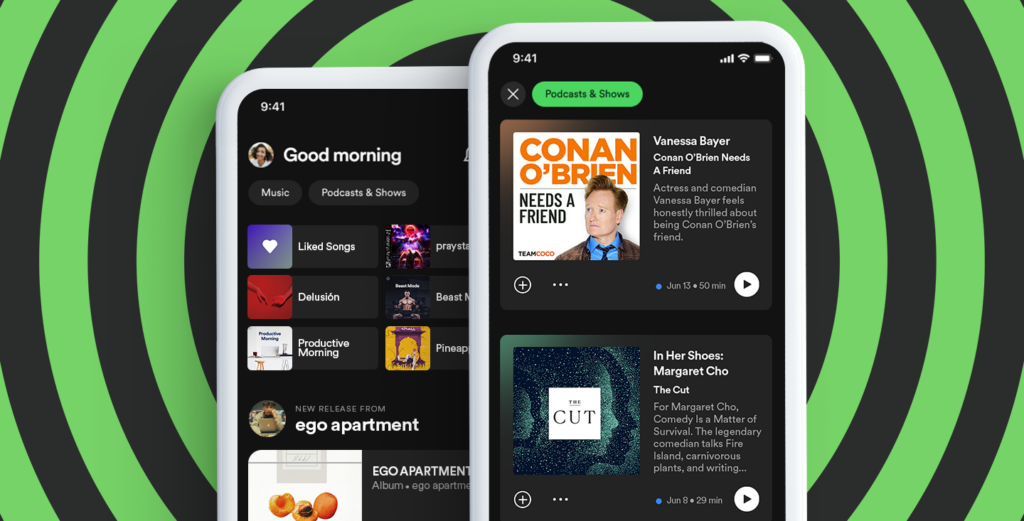
Source: Spotify.com
3. Analyze Your Performance to See What Works (And What Doesn’t)
Some posts grab attention and spark conversations, while others seem to fall flat. But how do you pinpoint why?
AI-powered analytics tools make it simple by breaking down your content’s performance and showing you exactly what’s connecting with your audience.
These tools analyze everything from engagement rates to audience demographics, which helps give you a clear picture of how your posts are performing.
For example, you might find that your video content consistently outshines your static images or that posts with specific hashtags drive higher interactions.
The insights go deeper, too. You’ll learn when your audience is most active, what topics they care about, and even which platforms are driving the best results. With this information, you can refine your strategy, focusing on what resonates and scaling back on what doesn’t.
Using AI analytics tools helps you make smarter, more informed decisions without spending hours combing through data.
4. Catch Trends Before They Take Off
In the fast-moving world of social media, spotting trends early can set your brand apart. Waiting too long to jump on a trend might leave you blending into the crowd, but getting in early? That can mean the difference between flopping and going viral.
AI-powered social listening tools help you stay ahead by tracking conversations, hashtags, and buzzworthy topics as they gain momentum.
These tools don’t just monitor what’s popular—they identify patterns in real time and show you what’s starting to pick up steam. For instance, if a new hashtag related to your industry begins trending, AI tools alert you before it becomes oversaturated. T
his gives you a chance to create content that feels timely and relevant, positioning your brand as part of the conversation when it matters most.
It’s not only about hashtags or viral moments. Social listening tools can highlight shifts in sentiment or emerging pain points among your audience. If there’s a growing demand for a specific type of product or content, you’ll know about it early enough to adapt.
Being part of a trend at the right time strengthens your connection with your audience and shows that you’re tuned into what they care about. With AI’s help, you’re always ready to make your mark.
5. Make Customer Support Fast and Friendly
No one likes waiting for answers—especially on social media, where everything moves at lightning speed.
So, you might want to invest in an AI chatbot to give your audience the quick, consistent support they expect while taking the pressure off your team.
AI chatbots are designed to handle repetitive questions with accuracy and a conversational tone. From answering basic FAQs to guiding users to the right information, these tools make sure your followers feel heard and valued.
A great example of a chatbot in action is Sephora’s chatbot on Facebook Messenger. It helps customers find products, book in-store makeovers, and get personalized recommendations.
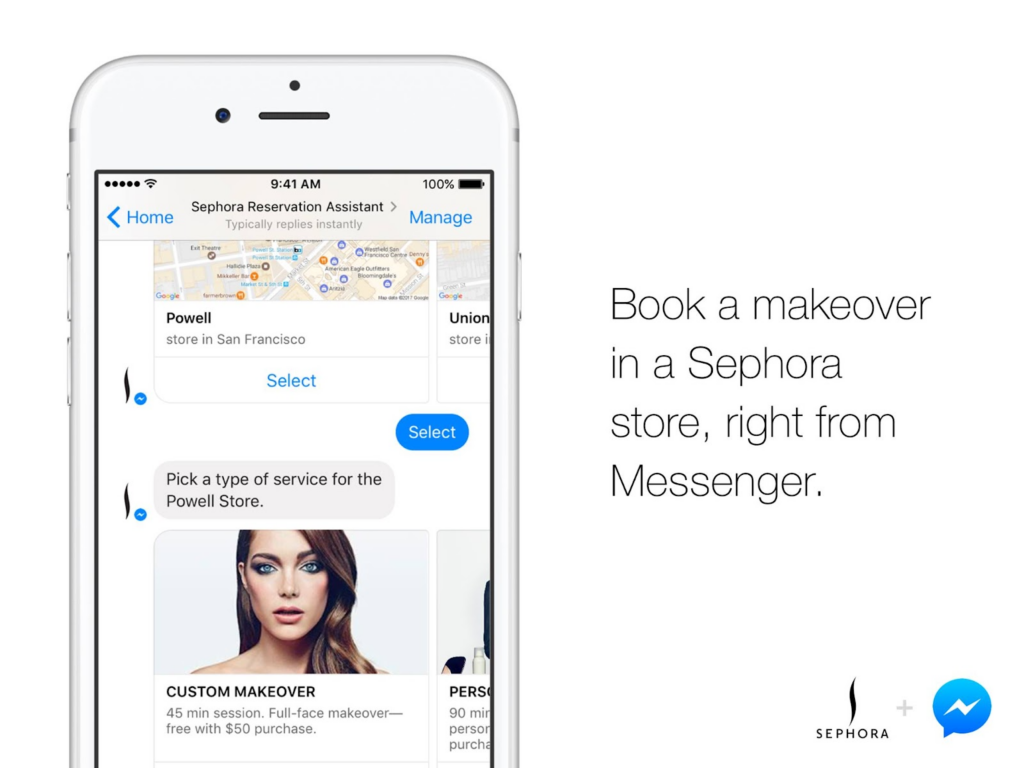
Source: Facebook.com
For example, if you’re searching for a new foundation, the chatbot asks about your skin tone, type, and preferences and then suggests tailored options. It can also share tutorials, reviews, or direct you to the nearest store to purchase.
Sephora’s chatbot stands out by combining convenience with personalization, all while offering an interactive shopping experience that feels helpful and engaging.
6. Supplement Your Content Creation Process
Keeping your social media content fresh and engaging can be challenging, especially when you’re posting on multiple social media channels.
Luckily, AI tools can make the process smoother by helping you brainstorm, refine, and organize your ideas.
Remember, though: It’s about supporting your creativity, not replacing it, so you can focus on delivering content that resonates with your audience.
Here’s how AI can fit into your social media content creation workflow:
- Quickly brainstorm topics based on audience interests, trends, or industry updates
- AI suggests options that align with your brand’s tone and style
- Find relevant hashtags to increase visibility and engagement
- Some tools help identify imagery or designs that suit your message
- AI checks for grammar, flow, and readability to make your posts shine
- AI can suggest new ways to use existing posts, extending their reach and impact
But don’t use AI as a shortcut. Instead, use it as a tool to work more efficiently and create more valuable posts.
For example, let’s say you’re promoting a new product launch. AI can analyze past campaigns to suggest an engaging caption, like “Excited to unveil our latest innovation! Who’s ready for something new?”
However, you can still adjust and add as you please. AI just does most of the tedious work, or it can also give you a framework to work off of!
7. Manage Your Ads More Easily
Don’t want your ad management process to be all manual?
AI tools can analyze how your ads are performing in real time so you can spot what’s working and what might need adjusting.
Say you’re running two versions of an ad—AI can quickly tell you which one is getting more clicks or engagement and suggest adjustments for the other.
Here’s how AI makes running ads feel less like a chore:
- Pinpoint targeting: It finds the perfect audience based on behaviors and interests.
- Smarter budgeting: Shifts your spending to the ads that are actually performing.
- Easy A/B testing: Tests different versions of your ad and tells you which one wins.
- Quick fixes: Flags underperforming ads so you can tweak them fast.
- Clear reports: Shows you what’s driving clicks, sales, or engagement.
With AI handling the nitty-gritty, you get to focus on the fun part—coming up with creative ad ideas that grab attention.
8. Repurpose Content to Make The Most Out of It
AI helps you make the most of what you’ve already created by suggesting ways to adapt it for different platforms and audiences. This way, it helps extend the life of your content while keeping it fresh and engaging.
For example, if you’ve written a detailed blog post, AI tools can help break it into smaller pieces for social media.
A single post could become a series of short LinkedIn updates, Instagram carousel slides, or even a Twitter thread.
Have a video? AI can assist in identifying key moments to turn into short clips for platforms like TikTok, Instagram Reels, or YouTube Shorts. For example, a 10-minute interview might yield a 30-second highlight clip for Instagram with auto-generated captions.
AI also helps tailor content for platform-specific styles. It might suggest swapping a formal blog title for a more casual Instagram caption or tweaking a visual to fit Pinterest’s aesthetic.
9. Monitor and Respond to Crises Quickly
Social media moves fast—sometimes too fast. A single negative comment or misunderstanding can spiral into a bigger issue before you know it.
To avoid this, you can use an AI tool’s early warning system to detect potential crises and take action before things get out of hand. AI tools monitor mentions of your brand, hashtags, and even related topics in real time. They can analyze the tone of conversations to spot spikes in negative sentiment.
For instance, if your latest campaign sparks criticism or a product issue starts trending, AI tools can flag it immediately.
Here’s how AI makes crisis management smarter:
- Be notified the moment a conversation about your brand takes a negative turn.
- Understand the mood behind comments to gauge the severity of the situation.
- Monitor specific phrases or terms that could signal trouble.
- See if similar issues are affecting others in your industry.
- Get suggestions on how to respond effectively, whether it’s an apology, clarification, or direct outreach.
A Word of Warning
AI can obviously be a transformative tool for social media, but relying on it too much can backfire.
A recent example is Coca-Cola’s AI-generated ad, which sparked debate about the risks of leaning heavily on automation.
While the ad showcased AI’s creative potential, critics argued it lacked the emotional depth and authenticity audiences expect from a brand like Coca-Cola.

Source: AIBusiness.com
This example highlights an important point: AI is a tool, not a replacement for human creativity. Overusing it can make your content feel impersonal, disconnected, or even off-brand.
Your audience is quick to notice when something feels “off,” and that can hurt your engagement and trust.
To avoid these pitfalls, think of AI as your assistant, not your creative director. Use it to automate repetitive tasks, analyze data, or generate ideas—but always add the human touch. Review AI-generated content carefully and make sure it aligns with your brand’s voice and values.
Striking the right balance is key. When AI supports your creativity instead of replacing it, your content will feel authentic, engaging, and relevant to your audience.
Remember, your followers connect with your brand’s personality—not just its efficiency.
Want an AI-Powered Social Media Management Platform?
AI has completely changed how businesses approach social media, turning it from a time-consuming task into a strategic advantage.
From creating personalized content to analyzing performance and automating repetitive tasks, AI helps you focus on the more value-adding tasks. It helps you save money along the way, too!
But the real power of AI lies in finding the right tools to support your goals. Whether you’re looking to simplify scheduling, track trends, or engage your audience with smarter strategies, an AI-powered platform can make all the difference.
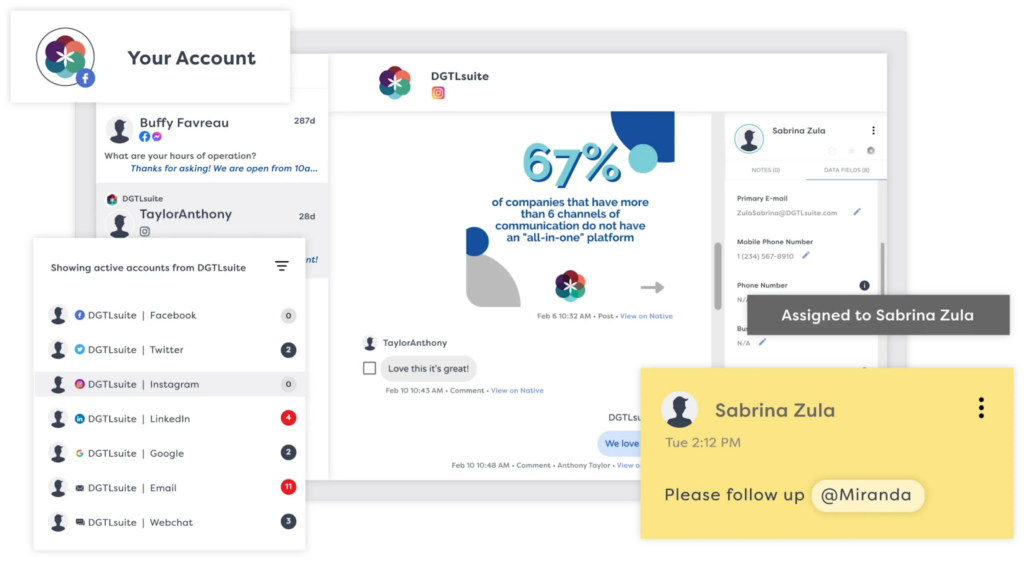
DGTLsuite is one such solution that brings everything together in one place, offering features like:
- Social media scheduling
- Real-time performance tracking
- Sentiment analysis
- Analytics dashboard
- Collaborative tools
- Multi-platform management
And everything else you need to optimize your social media workflows.
The key to success is balance. Let AI handle the heavy lifting, but always keep the human touch that makes your brand relatable. If you’re ready to explore how AI can elevate your social media game, take the first step today.
Book a complimentary discovery call here!
FAQs About AI For Social Media Management
Is there an AI for social media?
Yes, there are plenty of AI tools designed specifically for social media management. These tools can help with tasks like scheduling social media posts, analyzing engagement, creating content, and even tracking trends. A social media management tool like DGTLsuite integrates AI features to make managing social media easier and more effective.
How to use AI as a social media manager?
AI can streamline your work by automating repetitive tasks, partially creating social media content, analyzing performance metrics, and suggesting content ideas. You can use AI-powered tools to schedule posts, monitor audience sentiment, and track the success of your campaigns over multiple platforms. Think of AI as your assistant—it handles the data and logistics so you can focus on driving social media success.
Will AI social media tools take over social media management?
AI is a powerful support tool, but it’s not a replacement for human creativity or connection. While it handles tasks like automation and analysis exceptionally well, social media management still requires a personal touch to build genuine relationships with your audience. AI complements your efforts rather than taking over completely.
Which AI tool is best for social media content writing?
There are several great options for AI content writing. Tools like Copy.ai, Jasper, and DGTLsuite can help generate captions, hashtags, and even complete posts tailored to your audience. The best choice depends on your specific needs, budget, and desired features.
Can AI help with influencer marketing?
Yes, AI tools can identify influencers who align with your brand by analyzing audience demographics, engagement rates, and content themes. They can also track the success of influencer campaigns, helping you measure ROI and refine your partnerships.
